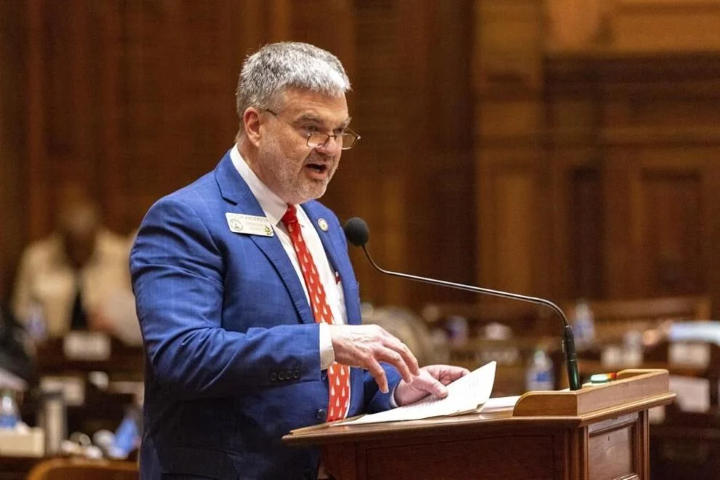
State Rep. Victor Anderson, R-Cornelia, speaks in favor of Election Bill SB 189, regarding ballot scanners, at the House of Representatives in the Capitol in Atlanta on Sine Die, the last day of the legislative session, Thursday, March 28, 2024. (Arvin Temkar/Atlanta Journal-Constitution via AP)
Georgia has been embroiled in intense battles over election laws since Stacey Abrams, a Democrat, narrowly lost to Republican Brian Kemp in the 2018 governor's race. These skirmishes reached a national scale in 2021 when Republicans, responding to pressure from GOP activists who echoed Donald Trump's unfounded claims of widespread electoral fraud in the 2020 election, passed a comprehensive law imposing new restrictions on voters.
With a likely rematch between Trump and President Joe Biden looming, Georgia is once again adjusting its state election laws. Just last week, Republican legislators approved a new bill allowing the removal of individuals from voting rolls via challenges to their eligibility. The bill awaits Governor Kemp's decision to sign it into law or veto it.
Proponents argue that these challenges are necessary to combat fraud by identifying duplicate records and removing voters who have relocated out of state. However, opponents assert that these challenges misuse data and subject legitimate voters to unnecessary legal scrutiny.
Voter challenges allow citizens to contest an individual's eligibility to vote based on personal knowledge, such as knowing a neighbor who has moved out of state. However, these challenges are increasingly being filed against large numbers of voters using impersonal data sources like the National Change of Address list maintained by the U.S. Postal Service. Some groups also scrutinize voter rolls to identify individuals not registered at residential addresses. For instance, prior to two U.S. Senate runoffs in 2021, the Texas-based group True the Vote challenged 364,000 Georgia voters. Since then, individuals and groups have challenged around 100,000 more.
These challenges stem from concerns that the current process for removing voters from the rolls takes too long under federal law. Republicans supporting large-scale challenges argue that the existing process, which can span five years, is inadequate.
Opponents criticize these mass challenges, labeling them as "vigilante" actions that disrupt the balance between updating voter rolls and safeguarding voting rights. They argue that such challenges disproportionately target younger and poorer voters, including African Americans, who tend to move more frequently. Additionally, they contend that these challengers include party activists and allies of Trump who endorsed his false claims of electoral fraud. The involvement of these individuals raises concerns about the partisan motivations behind the challenges.
The new bill passed by Republican lawmakers specifies various criteria for removing voters from the rolls, including evidence of death, voting or registering in another jurisdiction, tax exemptions indicating primary residence elsewhere, or non-residential addresses. Controversially, the bill allows the National Change of Address list to be considered, despite concerns about its reliability. However, the impact of the law remains uncertain, as the state has not provided guidelines to counties on handling challenges.
Opponents fear that the bill could disenfranchise legitimate voters and lead to legal challenges under federal law. They argue that homeless individuals may face additional obstacles in voting if required to use the county voter registration office as their address. Furthermore, they highlight the potential for voter intimidation and the logistical challenges faced by challenged voters in defending their eligibility.
The American Civil Liberties Union of Georgia has threatened to sue if Governor Kemp signs the bill into law, citing violations of the National Voter Registration Act. This act prohibits states and counties from making systematic changes to voting rolls within 90 days of a federal election, while the Georgia bill permits challenges up to 45 days before an election.















